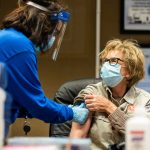As we enter the second half of 2021, the U.S. can reflect on the enormous progress that’s been made so far this year in the fight to end the COVID-19 pandemic. With almost half of the U.S. population fully vaccinated, many of us were able to enjoy gatherings with friends and family over the recent July 4holiday weekend. Tyson has been at the forefront of this effort, having vaccinated more than 53,000 of our U.S. team members, in addition to a growing number of our international team members, at on-site events held at our plants since late February.
Despite this progress, now is not the time to ease up in our efforts to vaccinate more of the population. As the risk from COVID-19 remains, it is critical to examine what else we can do to ensure the number of vaccines being administered over the remainder of the summer hold pace. At Tyson, we’re taking the time to consider what’s worked so far as we continue to work to vaccinate more of our workforce.
We recently convened an expert panel to consider what the early lessons of administering the vaccine have been, where we go from here, and what the overall approach to employee health taken by companies will look like post-pandemic. In bringing together those at Tyson who have been closely involved in the vaccine rollout with external experts from Matrix Medical Network and Pennsylvania Department of Health, it is clear that accessibility, education and trust remain the three most important barriers that must be overcome.
From a public health messaging standpoint, it is also important that we emphasize in the months ahead not only the individual benefits of being vaccinated, but also the broader societal benefits of helping others at risk who may not be able to receive the vaccine or elicit a less effective response to the vaccine due underlying health conditions. Such messaging remains particularly important when it comes to younger people who may have the view that COVID-19 poses a smaller risk to them and therefore the vaccine is not necessary.
The panel also explored how the pandemic has led employers to take a broader view when it comes to employee health and strategies to support their workforce. Employers are increasingly placing a greater emphasis on emotional and physical wellness alongside combating workplace injuries. The pandemic has been a catalyst in driving companies, such as Tyson, towards taking a more holistic approach to employee wellbeing. At Tyson we are launching pilot health clinics near seven of our facilities that will offer a wide range of healthcare services, often at no cost, for team members and their families.
Tyson Foods has invested millions of dollars and conducted more than 100 on-site vaccination events at our plants since February and we’re ready to do more. We also expanded our on-site vaccination efforts to include the families of team members. In addition, we continue to provide up to four hours of pay for team members who go off-site to be vaccinated.
Team members are not required to receive the vaccine, but we encourage them to do so, providing educational resources in multiple languages and a hotline staffed by our health experts if team members want to ask questions.
We continue to keep our guard up against the virus in other ways. We’re maintaining our existing COVID-19 mitigation and safety protocols, including an ongoing testing strategy involving thousands of tests every week.


